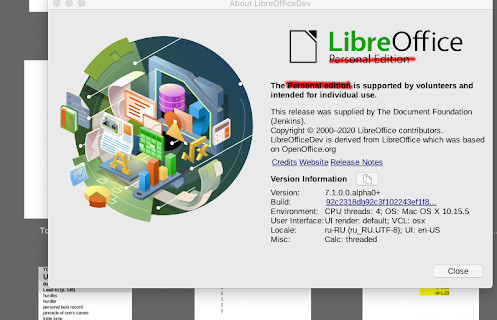

OVER the weekend, in the "Planet" of LibreOffice, one contributor complained [1] (links below) about what was addressed a day later (Monday) by the Document Foundation [2]. Some sites took notes of the clarification [3], some did click-bait nonsense [4] and others said that it had "raised some alarms since it implies that businesses, governments, schools, or other institutions might need a different license to use LibreOffice in the future."
"From what we can gather, there's nothing nefarious and/or sinister here. It was an honest mistake."Transparency is very important. Had the Document Foundation negotiated this language prior to implementing the changes (in "dev" build), a lot of negative publicity and rumours would be spared. From what we can gather, there's nothing nefarious and/or sinister here. It was an honest mistake. It served to highlight the need for participation at all levels. To avoid unnecessary misunderstandings always work in the open. ⬆
References
Look at LibreOffice logo with "Personal Edition" phrase, look at sidebar in Start Center with the same phrase and note to "The Personal edition is supported by volunteers and intended for individual use." And what is mean? Where is any public announcement? They say it was in marketing mail list. How many people read that mail list? Five? It means that I can't install LibreOffice 7.0 in any organization in Russia, because our controlling people will be see very simple to legality in this case: open the About dialog -> read that "intended for individual use" and LibreOffice logo with "Personal Edition" -> you can't use LibreOffice here! Nobody will check what say MPL 2.0 license about it or why TDF made it, they just point a finger at it and they will be right! It will close for LibreOffice any education organizations like schools or colleges or universities. I wont popularize LibreOffice for young people because they will never see LibreOffice in them schools. I against these changes. Please revoke it!
Thanks to the hard work put in by many individual and ecosystem contributors, working together as a team in different fields, such as development, QA, design, marketing, localisation, release engineering, infrastructure, just to mention some, in a few weeks’ time we will be welcoming our LibreOffice 7.0 milestone.
At the same time, we are discussing our vision for the next five years, with a starting point being marketing and branding. See our marketing and board-discuss mailing lists.
Due to draft and development work in the area of branding and product naming, some speculation, in particular related to the “Personal Edition” tag shown in a LibreOffice 7.0 RC (Release Candidate), has started on several communication channels. So let us, as The Document Foundation’s Board of Directors, please provide further clarifications:
1. None of the changes being evaluated will affect the license, the availability, the permitted uses and/or the functionality. LibreOffice will always be free software and nothing is changing for end users, developers and Community members.
2. Due to the short time frame we are working with, the tagline appeared on the RC and we apologise if this caused some of you to think we unilaterally implemented the change. Rest assured that the consultation with the Community is still ongoing.
Yes, it's true the LibreOffice builds in recent days -- including the new LibreOffice 7.0 RC1 -- have "Personal Edition" branding for the open-source builds. But given user concerns, The Document Foundation board has issued some clarifications to try to ease any immediate rumors, etc.
The LibreOffice builds provided are indeed marked now as "LibreOffice Personal Edition" as part of planned but not yet finalized marketing changes for LibreOffice. These builds of the open-source office suite remain free and available to anyone without restrictions.
If you are a Linux nerd or Windows user without much money, you probably use LibreOffice. That free software is actually quite good, although Microsoft's Office is far superior. Regardless of how you feel about the Windows-maker, its office suite of software is second to none. If you use Windows or Mac and can afford it, I always recommend using "real" Word and Excel over knockoffs, such as the aforementioned LibreOffice's Writer or Calc. Sadly, other than the web version, Microsoft Office is not available for Linux. With that said, as a Linux user, I appreciate LibreOffice's existence and use it regularly.
But what if LibreOffice wasn't free? Would people still use it if it cost money? Some folks became very worried about that exactly, as the release candidate of LibreOffice 7.0 labeled itself as "Personal Edition." To some, it was a sign that a paid version of LibreOffice was on the horizon. Well, guess what? They weren't totally wrong. In the future, you might find yourself paying money to use LibreOffice software. According to a new blog post from The Document Foundation Board aimed at quelling fears, however, there is no need to panic.
LibreOffice is a suite of office applications for creating, editing, and viewing text documents, spreadsheets, presentations, and databases, among other things. LibreOffice is free and open source software. Anyone can download it, use it, and even examine and modify the source code.
But with version 7.0 set to launch next month, some users have been noticing unusual language in pre-release builds suggesting that LibreOffice “Personal edition” is “intended for individual use.
That’s raised some alarms since it implies that businesses, governments, schools, or other institutions might need a different license to use LibreOffice in the future.